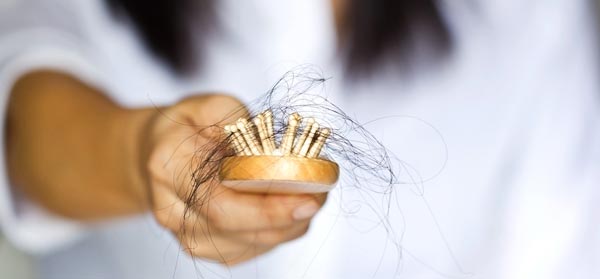For many people, their hair is their crowning glory. So it’s understandable that when hair loss or thinning is experienced, it can be quite distressing. Knowing what has caused your hair loss will help you determine the most appropriate treatment to return your locks to their former crowning glory.
Why am I losing my hair?
Men are more likely to experience hair loss than women but for women, the psychological effects are often greater.
The reasons for hair loss and thinning can be fairly simple, either linked to diet or stress; and the effects are often temporary. However, underlying health conditions can be more difficult to diagnose and the resulting hair loss may be more severe and even permanent.
So, aside from male-pattern baldness, why does it happen and what can you do about it? Here are eight causes and their suggested remedies.
Physical stress
Physical stress on your body, through trauma, illness, surgery, etc, can result in temporary hair loss known as telogen effluvium. This is essentially when the hairs natural cycle – a growth phase, rest phase and shedding phase – is shocked by a stressful event and it’s pushed into its shedding phase. It can take between three to six months after the traumatic event before hair loss becomes noticeable.
Usually when your body has stopped trying to recover from the trauma, illness or stress and your protein levels return to normal, your hair will grow back of its own accord.
Dietary issues
Lack of protein, too much Vitamin A or not enough Vitamin B can all result in loss of hair.
If you notice hair loss that can’t be attributed to any stress or trauma, then it could be worthwhile having your blood tested and levels of the above checked.
Emotional stress
While emotional stress is unlikely to actually trigger hair loss, it can exacerbate an issue that is already present. However, in certain circumstances – divorce, death in the family, caring for a loved one – emotional stress can be the cause.
Reducing emotional stress may not abate the hair loss issue but it can’t hurt. The loss will eventually abate and your hair will return to its normal growth phase.
Anaemia
Iron deficiency can result in anaemia, which can leave you feeling very lethargic, cause headaches, pale skin and even cold hands and feet. It can also cause you to lose your hair. If you have any of the above symptoms of anaemia and you notice you’re losing your hair, a quick blood test should confirm diagnosis.
The good news is that an iron supplement can often be enough and your hair should start to grow back.
Alopecia
The medical term for this autoimmune disease is alopecia areata. This type of hair loss occurs when the body essentially attacks itself from within, targeting the hair follicles. Bald patches, about the size of a 20-cent coin become apparent, although in extreme cases, most of your body hair can be lost.
Alopecia areata can’t be cured but there are treatments that arrest hair loss and promote regrowth. These can be discussed with a dermatologist.
Underactive thyroid
The thyroid produces hormones that keep your metabolism steady, and assist growth and development. If you’re not producing enough hormones, then you may experience hair loss as a side effect. You should seek medical tests to confirm the cause of the issue.
Medicine to boost hormone production in the thyroid gland will resolve the issue and your hair should start to grow back once your levels return to normal.
Sudden weight loss
Even if it is ultimately good for your overall health, sudden or dramatic weight loss can result in thinning hair. It may be that your diet is deficient in nutrients or your body has gone into shock.
Consider if your diet could be lacking and if need be, add a suitable supplement. Once your body stabilises, your hair growth should return to normal in about six months.
Ageing
Sadly, loss of or thinning of hair is not uncommon when you enter your 50s and 60s, and no one is really sure why this happens.
With no discernable cause, it’s not possible to define a treatment, but there are cosmetic approaches, such as certain hairstyles, not overusing styling implements, stopping chemical treatments and using good quality shampoo and conditioner will help keep your locks looking their best.
Related articles:
Hair loss in women
How much hair loss is normal?

